Political Ideologies - Socialism | 11th Political Science : Chapter 7 : Political Ideologies - Part-I
Chapter: 11th Political Science : Chapter 7 : Political Ideologies - Part-I
Socialism
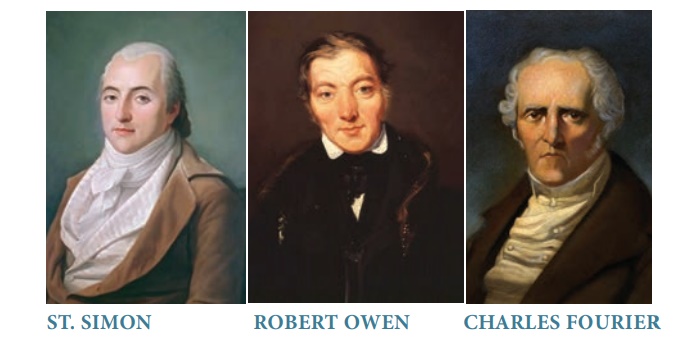
Socialism
Socialism is an ideology that supports public ownership of property and
natural resources. It is fundamentally opposed to Liberalism that believes in
the private ownership of property. There are many kinds of socialism like
democratic socialism, evolutionary socialism, Fabian socialism, guild socialism
etc. The terms ‘Socialism’ and ‘Communism’ are at times interchangeably used.
But Karl Marx introduced a distinction by describing his socialism and ideology
as scientific socialism and other prevailing kinds as Utopian socialism.
A. Utopian Socialism
Many thinkers in the 19th century had questioned the negative
consequences of liberalism. They strove to protect the interests of the working
class. Robert Owen was an industrialist and a philanthropist. He started the
cooperative movement and experimental socialist communities in England to
realise betterment in the conditions of the workers. He associated the workers
in the management of his industries and showed that profits can be increased by
the joint endeavour between workers and employers. He appealed to the reason of
the fellow capitalists to take into account the welfare of the working
classes.Saint Simon, a French industrialist and thinker, argued that the
welfare of the working class must also be taken into consideration for
realising an efficient economy and effective society.
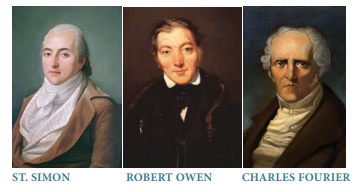
Charles Fourier, another French thinker, suggested the socialist
reconstruction of the society by forming association of producers termed as
phalanges. Both Saint Simon and Charles Fourier appealed to the conscience of
the capitalists to improve the miserable state of the workers. These three
notable theorists advocated ideas in favour of the workers in 19th century.
Karl Marx described their thoughts as Utopian Socialism as they provided only a
superficial understanding of capitalism and their alternative schemes are
wishful and utopian in nature. He claimed that, in contrast his communism is
based on scientific understanding of capitalism meriting the name of Scientific
Socialism.
B. Democratic Socialism
Democratic Socialism as the nomenclature indicates combines the two
systems of socialism and democracy to provide a unique political and economic
system to promote equality and freedom. It differs from Marxism in its
conception of the State. It believes that the State is not an instrument of
exploitation of workers by the capitalists. Rather, the State is an instrument
of social welfare. The State must be made democratic. All classes in society
own the State. Socialism can be established only through the State. It will not
and should not wither away as Marxism predicted.
Democratic Socialism argues that socialism can be established through
evolutionary and peaceful means. It’s methodology of change characterized as
gradualism or ballot box socialism. It dismisses revolutionary, violent
struggle as unnecessary. Democratic Socialism argues for harmonious relationship
among classes and class differences must be solved through peaceful methods.
The right to property need not be abolished. Rather for the sake of social
welfare the right to property must be limited.
There are crucial differences between Marxism and Democratic Socialism.
Many basic concepts of Marxism are either modified or rejected by Democratic
Socialism. Nevertheless, both have certain similar goals like ending the
exploitation of workers and promoting equality among people.
C. Fabian Socialism
Fabian Socialism was the British version of socialism propagated by the
Fabian Society from 1884. They chose the nomenclature Fabianism inspired by the
great Roman General Fabius who was historically famous for adopting the
military strategy of ‘wait and hit hard at the right moment’. Sidney Webb and
Sidney Oliver H G Wells brought out the ideology of Fabianism. English
playwright George Bernard Shaw was one of the greatest proponents of Fabianism.

As an ideology Fabianism attacked capitalism as an exploitative system
and advocated a thorough reorganization of economy and politics of their
contemporary period. It expressed its resolute support for democratic State.
There are two important attributes of the Fabian State. Firstly, it should be
based on decentralization of power. Secondly, it should be led by experts.
Fabianism rejected Marxist call for the abolition of the State. It wanted the
State to exist on the foundations of decentralized power and expert leadership
to promote social welfare.

Fabianism believed that socialism and democracy are complementary and
supplementary to each other. They are to be appreciated as noble ideals of
equality and justice are dearer to them. The Fabians did not advocate the abolition
of private property. On the contrary, they supported existence of limited right
to property governed by the principle of social welfare.
Fabianism as an evolutionary socialism rejected Communist revolutionary
methods of change. It supported peaceful methods of change in society. The
Fabian ideologues depended on persuasion tactics to realize socialism.
D. Evolutionary Socialism
Evolutionary Socialism was initially advocated by Lassalle, one of the
earliest leaders of the German Social Democracy tradition. The ideals of
Evolutionary Socialism were formally expounded in the Gothe Programme in 1875,
an important document in the evolution of socialism in Germany and Europe.
Later on, Eduard Bernstein wrote the book ‘Evolutionary Socialism’ that
attracted the many supporters like Jaures in France, Anseele in Italy, Bauer in
Austria. It argues for an evolutionary change in capitalism. It believes that
along with economic factors non-economic factors are also important to explain
human life. Democratic Socialism and Evolutionary Socialism are inter-related.
Marxism attacked Evolutionary Socialism as ‘revisionism’ and ‘broker’s view of
socialism’.
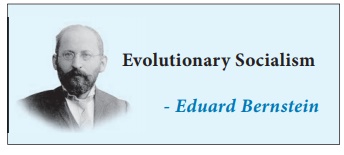
E. Guild Socialism
It is a kind of evolutionary socialism that emerged in Great Briton in
the first two decades of the 20th century. The English political thinker and
the founder of National Guilds League in England, D H Cole was the leading
advocate of this brand of socialism. He wrote the book ‘Guild Socialism: A Plan
for Economic Recovery’ to propagate the tenets of Guild Socialism. Guild
Socialism criticized the exploitation of workers by the capitalists in the
western world and arose as a protest ideology against capitalism
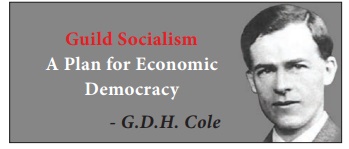
The word guild refers to the association of craftsmen and artisans of a
particular profession in the medieval period in Europe. It acted as a source of
mutual support, as a medium to pass on the professional knowledge to new
entrants. Guild Socialism combines the medieval guild with modern socialism and
envisages a political organization in which organized workers-based
associations will discharge most of the political functions. This ideology
believes that in any society there are numerous professions, trades and
occupations and a member of one profession cannot represent the interests and
welfare of members of another profession and therefore every profession must
have its own organization. All such organizations must come together to form a
governing council at the district, State and national-levels to administer the
system. A national-level confederation of guilds will govern the country.
Guild Socialism does not call for the destruction of the State. It
endows the State with certain common functions like providing education and
health services to the people. Guild Socialism supported the principle of
gradualism to bring about changes in the existing capitalist system.
It abhorred the revolutionary methods of struggle associated with
Marxism. All changes in society should be brought through peaceful and
democratic means. This was a cardinal principle of Guild Socialism.
Though Guild Socialism was laudable in its commitment to the welfare of
workers it was criticized as an impractical alternative. Its attempt to reduce
the State to the position of an ordinary guild was not accepted by many
political theorists who asserted that the weakened state of Guild Socialism
cannot maintain law and order and protect its people from invasions and
insurrections.
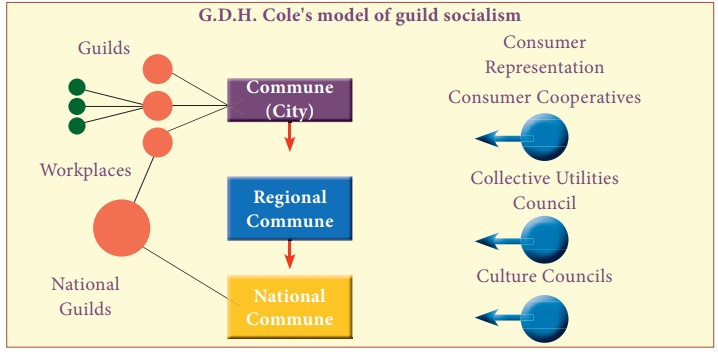
Differences between Communism and Socialism
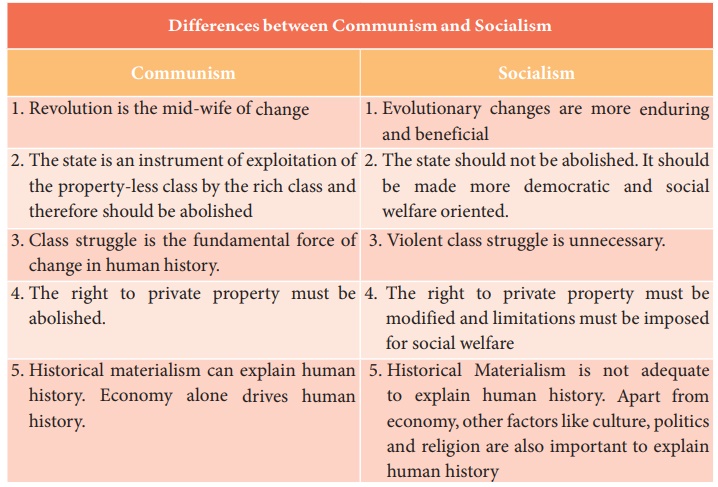
F. Socialism in India
The Indian kind of socialism is known as Socialistic Pattern of Society
that was adopted by the Indian State in the mid 1950s. Provision of all basic
necessities to all people irrespective of caste, creed, religion, race and
gender and elimination of poverty, inequality and illiteracy are the objectives
of Indian Socialism. Parliament passed a resolution for the establishment of
Planning Commission In 1950. The strategy of Five Year Plan was implemented to
promote development with socialist content from 1951. We adopted a Mixed
Economy where both private and public sectors were allowed to operate. We
provided the commanding heights of the economy to the public sector to achieve
development and equality.
The 42nd Constitutional Amendment Law introduced socialism as an
official feature of the Preamble of our Constitution. The 44th Constitutional
Amendment Act removed the Right to Property from the list of Fundamental Rights
and made it an ordinary right in Part XII of the Constitution. The Directive
Principles of State Policy in Part IV of the Constitution contains many
provisions that are designed to promote socialistic objectives like Right to
Work and avoidance of concentration of wealth in the hands of a few people.
India had adhered to socialism from the year of independence to 1991 when we
launched our New Economic Reforms that favored liberalization, privatization
and globalization.
Related Topics